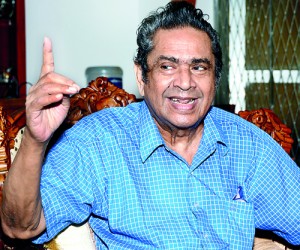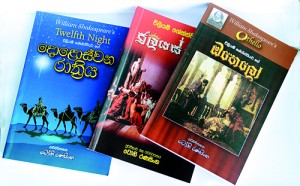Tony’s new chapter in life
He is acting no more although he strode like a colossus across the silver screen for nearly half a century.
Now 77, for Ranasinghe Hettiarachchige Ignatius Anthony Silva, excitement pulses through his body not when playing villain or hero before adulating fans, but in a much more intricate role. Poring over the dramatic works of William Shakespeare day in, day out, he has decided to open up the timeless world of the Bard, through translation, to the people of Sri Lanka.

Still ‘dashing’-Tony Ranasinghe makes a point. Pix by Nissanka Meegoda
It is on an overcast day that the Sunday Times visits actor Tony Ranasinghe at his home in Kuppiyawatte, close to Nalanda College, to look back at what he has achieved and look forward to what he is hoping to achieve, during a lengthy but witty and interview with this thespian.
Glimpses of the dashing young man surface, when although he greets us with tousled hair, he takes a minute to slick it down with a comb for the photographs, asking the photographer cheekily whether he looks good………there is no doubt that he does.
Memories of his childhood in Modera are hazy, except for one which is crystal clear. Living close to Raasa Muna Kanda on which were fixed huge guns, he remembers when he was about four years old, the window panes in his home shattering when those guns were fired.
From a staunch Roman Catholic family, it was a school managed by St. John’s Church that he attended until fears of Japanese air-raids compelled people including his family to leave the area. Tony’s family moved to Wattala, with his education continuing at St. Anne’s College.
It is this Catholic upbringing that he credits with for his professionalism, smiles Tony (abbreviated from Anthony), adding that the ingrained self-discipline also went a long way.
The pull towards acting came in 1948, when he was just 11 years old, as he watched wide-eyed a stunning performance on celluloid by Laurence Olivier in ‘Hamlet’. There were also two home-grown Tower Hall dramatists that Modera was famous for – W. Livinus Perera and S.D. Steven Silva.
The memories flow of the 100th anniversary of the church being celebrated with the dramatisation of the life of St. John the Baptist, taking the cast from the village. The actors brought to life St. John and all those around him. Seared into tender Tony’s memory is ‘John’ walking with a lamb by his side, as he watched from a vantage point the actors rehearsing and going over their dialogues.
Gripping too had been the beheading of St. John when the play was enacted in a cadjan shed. With the actor keeping his head on the block, as the sword came down, he would move it to fit into an empty space, while someone would press a spring and a bogus head would topple off.
School came to an abrupt halt in Senior Prep for Tony when Brother Director Herman Gild wanted his class to memorise the Bible. He resented such a dictatorial attitude, “had a little brush” with the Director and left, to join Commercial College trying his hand at short-hand, typing and book-keeping.
“I was good in short-hand but not book-keeping as I was weak in arithmetic,” says Tony frankly. With a certificate from London testifying that he could take down short-hand at 80 words per minute and type 40 words per minute, the job-seeking began first as a Hansard reporter, then as a court reporter (“the first test I passed with flying colours, but when the second test was actually taking down court proceedings, with the judge looking on sternly I failed,” he says), finally joining the Department of Government Electrical Undertaking (now the Ceylon Electricy Board).

Tony’s literary contribution: A tribute to the Bard. The books with the covers designed by Prem Dissanayake have been published by Fast Publishing (Pvt) Limited.
It was here that he hesitantly approached the CC (chief clerk), wanting to shed the Silva part of his name, thinking that he would have to contend with the formalities of inserting an advertisement in the newspaper. But the CC had told him that as he was a government servant, he only had to inform the Shroff, which he did promptly, becoming ‘Tony Ranasinghe’.
The yearning to act stirring within him, it was also around this time that he accompanied Arthur U. Amarasena, actress Sriyani’s husband, to meet Sirisena Wimalaweera, the first to build a film studio — the Nawa Jeevana Chithragaraya in Kelaniya
Vivid are his memories – being introduced to a balding man clad in a sarong and banian. The studio had just two other rooms – one with a sole chair for Wimalaweera with everyone else sitting cross-legged on the floor at the feet of the ‘Master’ and the other the make-up room.
To Wimalaweera’s query, “Rangapala thiyenewada” (Have you acted before?), his answer had been, “Ne (no) Master”. He was being tried out for the film ‘Punchi Amma’ with the main role being played by Rani Ratnatunga.
Wimalweera’s words to Tony, were simple: “Vayu tharanga anuwa wachana kiyanna.” (Use the air waves when reciting your lines).
Although it was great advice Tony got on diction, the movie never saw the light of day, as also did not ‘Rodi Kella’, though he had been summoned to “debas kiyawanna” (read the dialogue) and saw a comely girl seated before the Master. (What Tony did not know at that time was that it was Yvonne Perera who was re-named ‘Sandhya’ Kumari by Wimalaweera as she had come to meet him in the evening).
Once again called to act, this time by K.W. Perera in ‘Sanasuma Kothanada’ in 1963, Tony reminisces how he met Sandhya Kumari who recalled their earlier meeting.
Office work, meanwhile, was going on as usual for Tony, but he longed to act. Having seen an advertisement for a ‘leading man’ and arriving in his office attire which included a tie at the Bristol Building in Fort, he had encountered a long queue and popped into the Colonial Hotel for a pint of Stout. When he returned, the queue had vanished but at the entrance was T. Somasekeram who had hired him on the spot for the role in ‘Deepa Shika’. However, when Kingsley Raj took over from Somasekeram and during rehearsals when Tony requested a script, he had shown him the door on the assumption that he (Tony) was “an uppish guy”.
Dejected and at the butt end of jokes of his colleagues, Tony, the aspiring-actor then once again went back to Amare who then took him to Lester James Peries who was filming ‘Gamperaliya’. Accompanied by Sumitra and Gamini Fonseka, Lester had watched him act in Sugathapala de Silva’s stage drama ‘Boarding Karayo’ and although it had been Lester’s view earlier that he should have come before as the final casting had been done, Lester had given him the small role of Baladasa.
It was then that his path crossed that of Willie Blake who told him in no uncertain terms that the Director was boss and no actor was indispensable.
Baladasa was Tony’s stepping stone to the glitzy and glamorous world of movies. The rest is history. Having launched his acting career in theatre with a role in ‘Ran Thodu’ in 1963 for which he was honoured with the Governor General’s Award for Best Stage Actor, there was no turning back for him. In movies, after ‘Gamperaliya’, followed ‘Ran Salu’, ‘Delovak Athara’ and numerous others such as ‘Parasathu Mal’, ‘Hanthane Kathawa’, ‘Duhulu Malak’, ‘Ahasin Polawata’, ‘Ganga Addara’ and ‘Saptha Kanya’ as well as many awards and dabbling in screenplay writing for ‘Koti Waligaya’, ‘Keli Mandala’ Awaragira’, ‘Pavuru Walalu’ and ‘Duwata Mawaka Misa’.
He was also not a bachelor any more having married Sirima Indrani Wickremasuirya, who had nothing to do with cinema, and is the father of four children and six grandchildren now.
An attack of cellulitis in 2007 which forced him to undergo a calf operation followed by a stomach ulcer in 2011 which also entailed surgery making him “not so mobile”, put paid to his film career.
Looking back, Tony feels that although he got rave reviews for the characters that he played, there were obvious flaws. “Maybe my good looks and the director’s capability helped a non-actor to become an actor,” he smiles, adding however that he did develop his own style of acting.
“Good acting is not imitating. Good acting does not mean changing noses or wearing wigs. Good acting is when people look at you on stage or film and think you are the person whose role you have taken and not Tony Ranasinghe.”
Our chat circles back to his favourite topic — Shakespeare, with Tony, without book or paper, ‘slipping’ mentally between the pages and quoting verses with aplomb.
He admits he has “a craving for Shakespeare” and even though many believe that Shakespeare is untranslatable it has been proven possible with translations now available in German, French, Russian, Japanese and even Hindi.
It is with this conviction that he has immersed himself in Shakespearean translations into Sinhala, releasing ‘Julius Caesar’ in 2005-06, followed by ‘Twelfth Night’ last year. He concedes that he may not be able to translate all the works of the Bard but he will keep at it.
As he sits with his books every morning, if he feels overwhelmed by ‘Hamlet’ he would switch to a different text of Shakespeare, with Prof. Tissa Kariyawasam and Dr. Lakshmi de Silva only a phone call away when he needs advice with regard to his translations.
While ‘Othello’ is hot off the presses and ‘Midsummer Night’s Dream’ is in print, he is currently working on ‘Hamlet’ and ‘Much Ado About Nothing’.
For Tony, blessings have come in disguise. “If I was okay and hadn’t undergone operations, I would be involved in teledramas. But being confined to the house has given me ample time.”
Ample time to be with his beloved Bard!


